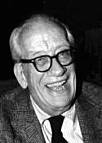Dr. Welch

Dr. Welch was born on September 12, 1911, in Eau Claire, Wisconsin. In 1929, he graduated The Blake School, near Minneapolis, Minnesota, and attended Yale College, where he graduated in 1933. A loyal Yale man, in later years he would reminisce about the monumentally wastrel existence he pursued there, but his brilliant use of language, thoughtful approach to medical and human fact, and lifelong love of the study of American and world history suggested that he had not spent his time quite so prodigally as alleged.
An initial position in advertising, with Benton & Bowles, left him unsatisfied and he quickly reoriented his career into medicine. He graduated the College of Physicians and Surgeons, Columbia University, in 1942, and completed his internship and a residency in cardiology at Bellevue Hospital in New York. From 1942 through 1946, he participated as a captain in the U.S. Army Medical Corps in a malaria research project under the direction of Dr. James Shannon, who later became director of the National Institutes of Health. In 1950 through 1955, he was in private practice in Princeton.
Returning to New York City, where he practiced privately from 1955 through 1981, he was affiliated with New York University Medical Center and Doctors’ Hospital, and was Medical Director of the New York Cardiac Center in Yonkers.
Until year of his death, Dr. Welch retained his rank at NYU as an Associate Professor of Clinical Medicine.
In the 1950s and ‘60s, Dr. Welch wrote a syndicated newspaper column called “Dr. Welch Says,” on medical issues, and conducted a call-in radio show, “Ask Dr. Welch,” again on medical issues.
One Saturday morning in l934 he walked by the office of young Louise Michel, and because she had “the best looking legs at Benton & Bowles,” he asked her out to lunch. Thus a sixty-odd year romance began, and thus he connected first with the New York group that had been started by A. R. Orage, a mentor and substitute father of the orphaned Louise, and later with Orage’s master, G. I. Gurdjieff, when he next came to New York.
Welch waited to marry Louise until 1941, when he had almost finished his medical studies, though he had already become a father figure to her two children.
In his private life he was attending lectures by P. D. Ouspensky during the war and was one of a small circle around Gurdjieff when he came to New York in fall of l948 and winter of l949. When Gurdjieff became ill in Paris in the summer of l949, Welch was in constant contact with the doctors attending him, suggesting medicines and treatment, and when the illness became ominous in October, suggested trying a new medicine which he offered to send them. But Gurdjieff responded that he should come himself to administer it, so after an incredible one-day preparation in which he managed to get the medicine, a plane ticket and a new passport, he flew to Paris, his first trip abroad.
Gurdjieff greeted him with his usual expansive: “Ah, dock-tor, bravo America!,” but Welch saw how serious his condition was and immediately told him in the commanding voice of a doctor accustomed to make such decisions: “You should be in the hospital!” To the astonishment of those gathered around him, including his closest students and several of his doctors, Gurdjieff accepted at once, and they went together in an ambulance to the American Hospital of Paris, where Welch attended him until Gurdjieff died a few days later.
From 1984 until his death, Dr. Welch was President of the Gurdjieff Foundation in New York City and advisor to affiliated Canadian organizations, the Society for Traditional Studies in Toronto and the Association for Experimental Studies in Halifax, both of which he co-founded with his wife Louise. From the mid-1950s, Dr. Welch and his wife had a wide circle of friends of all ages with whom they shared their understanding of the Gurdjieff teaching.
Dr. Welch was a worldly man, contributing vigorously in many walks of life. But surely in his most intimate being, which one heard at times in his words and felt in his attitude, he belonged also to another world, a spiritual world.
From “Louise Welch — Essence Friend” by David A. Young
«Dr. Welch said:
We are always looking in the wrong place for purpose, for meaning. We are heavy-laden with this big, blind automaton. Only in moments when our functioning is slowed down does the unengaged purpose appear. What is our life for? What in hell are we doing here?»
«Dr. Welch never hesitated to let the air out of our inflated expressions. A very serious and relatively senior member of our group said, “All my life I have given to others!” Dr. Welch said, “You have never given anyone anything. Always others have taken from you.” It was a piercing insight, and the person who had spoken immediately saw that it was true.»
«Mrs. Welch said that Dr. Welch had a long-lasting love affair with the English language. As he spoke, he seemed to be searching for just the right word, the exactly turned phrase. What he said was often alive, and fresh, and memorable. In contrast, although I might be expressing the same ideas, I usually felt my words were careless cliches, and I aspired to speak as he did.»
Articles about Dr. Welch:
Articles by Dr. Welch:





